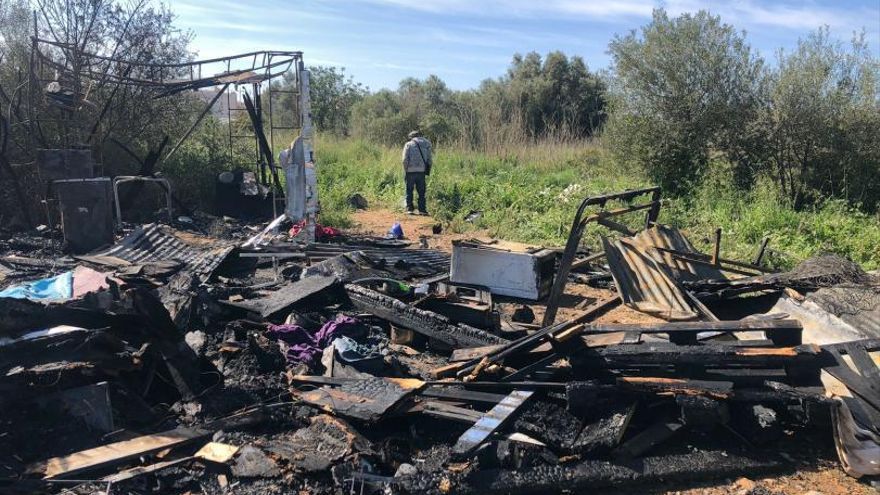Around fifteen people are currently living on the grounds of sa Joveria, between the fairgrounds and the Can Misses Hospital, according to the figures kept by the Ibiza Town Hall Social Welfare department. “There are people in shacks and others who live in their vehicles,” says the councilor of the department, Carmen Boned, who adds that “it is likely that in the coming weeks this figure will increase as the season begins”. For the moment, they have not detected that minors live here, as they are aware of in the Can Escandell area.
The Town Planning department reminds us that this land is private, so “permanent contact is maintained with the owners so that they keep it in good condition”. The City Council assures that they have been trying to act in the area for weeks, but “the rains have prevented it”, and they are not claiming that they are going to take any measures on the land following the fatal incident last weekend when several shacks burnt down.
In this regard, they say that, in coordination with the property, the trees will be pruned so that there is “more visibility” and thus prevent camping, in addition to large stones being placed at the entrances to the farm to make it difficult for vehicles to enter, as has been done on previous occasions. “Not everything can be fenced off because there are many hectares and, in addition, it cannot be closed off completely because it is necessary to allow access to the emergency services in case it is necessary,” they point out. For the moment, in the next few days, technicians from the council will come to check how many dwellings there are at the moment and, on that basis, they will study “whether it is necessary to open a sanctioning file“.
They also reiterate that in the areas where they detect this type of settlement, the City Counsil carries out different actions. “The owner of the land at the entrance to Can Misses fenced it off, but in other cases we have acted accordingly. We work with the cleaning company Valoriza to remove waste, we have made firebreaks with Ibanat and the Policía Local come regularly to carry out inspections,” he explains.
Social Welfare Actions in sa Joveria
As for the profile of these people, Boned explains that it is very varied, although “the vast majority suffer from mental health problems, some even dual pathology (an addiction and another mental disorder)”. This makes it difficult for Social Services technicians to attend to them. “We do a follow-up and offer them the services we have, but sometimes they don’t want them”, she says.
In fact, the man who died in the fire “was a user of a social work unit and received financial benefits from the City Council”, the councilor points out. But there are people who, even living in these conditions, do not require help because they have a job. “They have an income, but not enough money to pay rent, given the current prices, and they live in cars,” she says, “so they don’t want our help.
The fact that they suffer from mental problems means that this is no longer the exclusive responsibility of the Social Welfare department, but requires networking with health and organisations such as the Red Cross. Boned stresses that, being the municipality with the largest population and where most people in vulnerable situations live, “they do not work alone”. She refers to the Social Exclusion Committee, which is made up of Caritas, the Red Cross, Fundació Deixalles, Dignity, Doctors of the World, the Policía Nacional, citizen participation agents, the Ibiza Council and all the island’s town halls, with whom they discuss how to act according to each case.
According to the census handled by the City Council’s social services, and pending an update in the coming weeks, there are between 80 and 100 people living in precarious conditions in one of the shantytowns around the city or on the street.
For the full article, please visit Diario de Ibiza website here.

